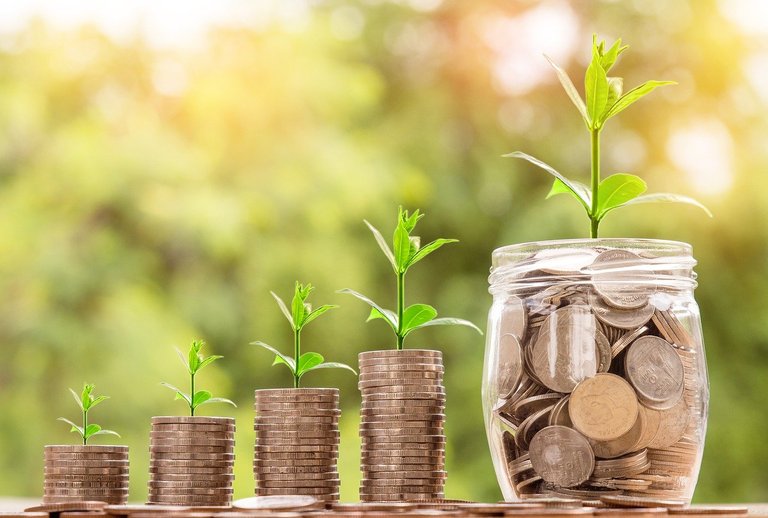
¡Hola, amigos de Leo Finance! Primera vez que publico por acá, pero la idea de este post estuvo dando vueltas en mi cabeza durante esta semana y quise por fin materializarla.
Hace poco, una amiga que llamaremos Marna, llegó a mí muy deprimida. Tuvo que asumir la carga financiera de su casa y eso la tenía vuelta un lío.
Me consultó porque sabe que yo llevo años siendo la cabeza de mi hogar. Ayudando financieramente a mi madre y... más recientemente, me mudé con mi pareja y él y yo mantenemos la casa y a nuestro hijo.
Así que ella tenía problemas con su libertad financiera, no solo con sus finanzas actuales. Porque ¿Cómo iba a ser libre a largo plazo si no tenía algo estable en el presente?
Desde hace tiempo estuve pensando en eso y le hallé una solución.
Hello, friends of Leo Finance! First time posting here, but the idea for this post has been going around in my head this week and I wanted to finally bring it to fruition.Recently, a friend we'll call Marna, came to me very depressed. She had to take on the financial burden of her house and that had her in a mess.
She consulted me because she knows that I have been the head of my household for years. Helping my mother financially and.... More recently, I moved in with my partner and he and I are supporting the house and our son.
So she was struggling with her financial freedom, not just her current finances. Because how was she going to be free in the long run if she didn't have something stable in the present?
I had been thinking about that for a long time and I found a solution.

1.- Dejar de vivir del hoy
Sí, claro, vivir el hoy es importante. Comer hoy es importante. Pagar hoy es importante. Pero, ¿Cómo pagarás mañana? ¿Cómo pagarás en un mes? Para hacerlo hay que trabajar primero un tiempo suficiente.
¿Cómo lo logramos? Ahorrando.
2.- Poner todo en orden con las finanzas
Pero ¿Cómo vas a ahorrar si ni sabes cuánto ganas? Para eso, hay que ordenar todo. Sacar cálculos de lo que obtienes y lo que gastas.
En gastos se incluyen comisiones, cosas indispensables (servicios, comida, renta) y los "lujos".
Eso hice con mi pareja cuando nos mudamos. Hicimos una lista de las cosas que necesitaba una casa, buscamos precios y las partimos a la mitad.
Resultó que para mantener nuestra casa necesitábamos 200 dolares mensuales. Él gana 180 mensual y yo 140. De modo que yo destino 100 y él 100 al mes.
A partir de ahí puedes saltar al siguiente paso.
3.- Ahorrar
Destina un porcentaje de tus ingresos al ahorro. No tiene por qué ser algo grande. Recuerda que lo pequeño, a largo plazo, se vuelve grande.
Ahorrar es un acto de voluntad. Un "NO TOQUES ESE DINERO". Es un tomar consciencia.
Por ejemplo, yo destino 20 dolares mensuales al ahorro a largo plazo.
## Stop living for today.Yes, of course, living today is important. Eating today is important. Paying today is important. But how will you pay tomorrow? How will you pay in a month? To do so, you must first work long enough.
How do we do that? By saving.
Put everything in order with finances.
But how are you going to save if you don't even know how much you earn? For that, you have to put everything in order. Calculate what you earn and what you spend.
Expenses include commissions, indispensable things (utilities, food, rent) and "luxuries".
That's what I did with my partner when we moved. We made a list of the things a house needed, looked up prices and cut them in half.
It turned out that to maintain our house we needed $200 a month. He makes 180 a month and I make 140 a month. So I spend 100 and he spends 100 a month.
From there you can jump to the next step.
3.- Save
Set aside a percentage of your income for savings. It doesn't have to be something big. Remember that small things, in the long run, become big.
Saving is an act of will. A "DON'T TOUCH THAT MONEY". It is an act of awareness.
For example, I set aside $20 a month for long-term savings.

¿Y cómo me ayuda esto a la libertad financiera?
Soy de quienes opinan que no puede haber libertad financiera sin un trabajo duro previo. La realidad es que, como le dije a Marna, suelo invertir mi dinero ahorrado (Y los otros 20 que sobran de mi sueldo) en criptomonedas y en un pequeño negocio que tuve que cerrar el año pasado por el Covid 19.
Tenía un negocio de juguetes sexuales próspero, que volveré a abrir.
Es decir, estoy reuniendo para llegar a 200 dolares, que es mi meta y, mensualmente, pongo 20 en la inversión de la tienda, comprando juguetes al mayor.
Los 200 serán para hacer una inversión más grande a largo plazo.
Así que mi recomendación es emprender.
Y sí, sé que parece elemental, pero es algo que muchas personas, como Marna, no saben. De hecho, es algo que aprendí con el tiempo, ensayo y error y redactando muchos artículos de finanzas.
Además, también aprendí algo importante: Trabaja para lo que necesitas, invierte y no te revientes; el dinero llegará solo a la larga.
Antes era una freelancer kamikaze. Viviendo para trabajar y ganar cada vez más, hasta que me di cuenta de que todos ganaban, menos yo... Entonces, empecé a invertir, a ganar dinero de mi tienda y a relajarme más.
Hasta que el Covid llegó y esa es otra historia.
Lo que me importa es que Marna y todos entiendan el principio básico: luego del trabajo duro, llega las recompensas.
## And how does this help me to financial freedom?I am of the opinion that there can be no financial freedom without prior hard work. The reality is, as I told Marna, I usually invest my saved money (
And the other 20 left over from my paycheck) in cryptocurrencies and a small business that I had to close last year because of Covid 19.I had a thriving sex toy business, which I will reopen.
That is, I am raising to get to $200, which is my goal and on a monthly basis, I put $20 into the store investment, buying toys wholesale.
The 200 will be to make a larger investment in the long term.
So my recommendation is to undertake.
And yes, I know it seems elementary, but it's something that many people, like Marna, don't know. In fact, it's something I learned through time, trial and error and writing a lot of finance articles.
In addition, I also learned something important: Work for what you need, invest and don't blow it; the money will come on its own in the long run.
I used to be a kamikaze freelancer. Living to work and earn more and more, until I realized that everyone was earning but me.... So, I started investing, earning money from my store and relaxing more.
Until Covid came along and that's another story.
What matters to me is that Marna and everyone understands the basic principle: after the hard work, comes the rewards.

Buenas sugerencias amiga.
La libertad financiera llega con le trabajo duro, emprender y ganar
saludos @anapa.pdf
Efectivamente, es un trabajo hoy para cultivar mañana.
Mucha disciplina, compromiso y esfuerzo para lograr avanzar en el mundo de las finanzas personales. Depende de solo nosotros. Muy interesante reflexión amiga. Saludos.
Gracias por esas sugerencias @anapa.pdf y puntualizando lo de ahorrar que aunque mucho lo subestiman o dejan a la ligera, este no deja de ser un aspecto clave para la estabilidad financiera. Éxito con tu trabajo. Saludos. ☺